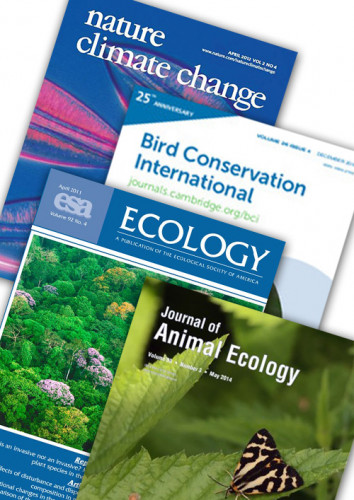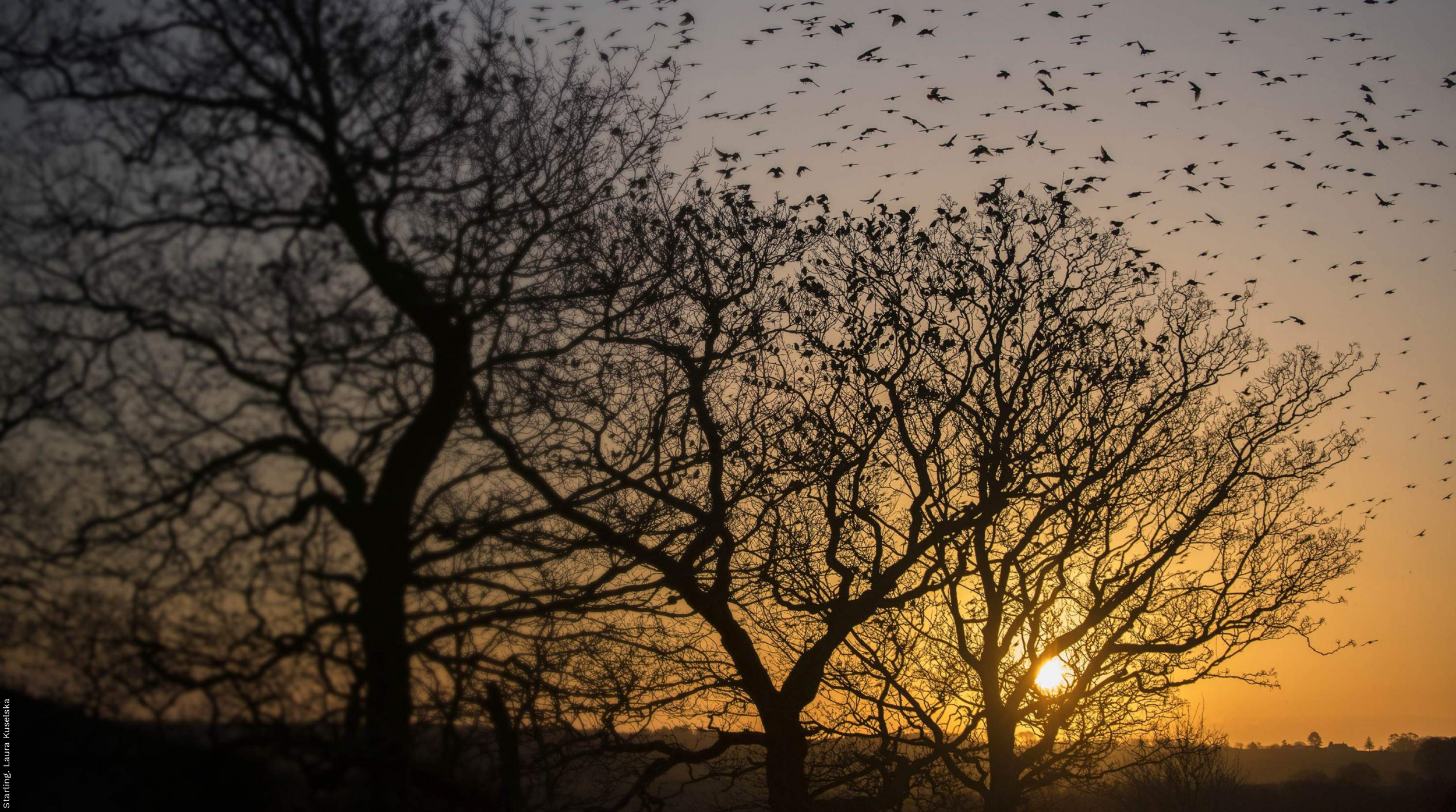Peer-reviewed papers

It is BTO’s policy to make public the results of our research. Our aim is to publish as much as possible of our work in the peer reviewed scientific literature. Many results are also published in our BTO Research Report series.
2012.
Greater impacts of wind farms on bird populations during construction than subsequent operation: results of a multi-site and multi-species analysis.
Journal of Applied Ecology
49 (part 2)
: 386-394
View Abstract
Link to Article (DOI: 10.1111/j.1365-2664.2012.02110)
2012.
Pangloss revisited: a critique of the dilution effect and the biodiversity-buffers-disease paradigm.
Parasitology
139 (part 7)
: 847-863
View Abstract
Link to Article (DOI: 10.1017/S0031182012000200)
2012.
Climatic associations of British species distributions show good transferability in time but low predictive accuracy for range change.
PLOS ONE
7 (part 7)
View Abstract
Link to Article (DOI: 10.1371/journal.pone.0040212)
2012.
Composite bird indicators robust to variation in species selection and habitat specificity.
Ecological Indicators
18
: 200-207
View Abstract
Link to Article (DOI: 10.1016/j.ecolind.2011.11.008)
2012.
Modelling changes in species' abundance in response to projected climate change.
Diversity and Distributions
18
: 121-132
Link to Article (DOI: 10.1111/j.1472-4642.2011.00827.x)
2012.
Population processes in European Blackbirds Turdus merula: a state-space approach.
Journal of Ornithology
152
: 419-433
View Abstract
Link to Article (DOI: 10.1007/s10336-010-0612-y)
2012.
Flexibility in phenology and habitat use as buffers to long-term population declines in UK passerines.
Ecography
35
: 604-613
Link to Article (DOI: 10.1111/j.1600-0587.2011.06797.x)
2012.
Landscape, cropping and field boundary influences on bird abundance.
Ecography
35 (part 2)
: 162-173
View Abstract
Link to Article (DOI: 10.1111/j.1600-0587.2011.06839.x)
2012.
What are the forthcoming legislative issues of interest to ecologists and conservationists in 2011?.
British Ecological Society Bulletin
43 (part 1)
: 12-19
2012.
Enhancing the value of horizon scanning through collaborative review.
Oryx
46 (part 3)
: 368-374
View Abstract
Link to Article (DOI: 10.1017/S0030605311001724)
2012.
A collaboratively-derived science-policy research agenda.
PLOS ONE
7 (part 3)
View Abstract
Link to Article (DOI: 10.1371/journal.pone.0031824)
2012.
Ageing Wrens Troglodytes troglodytes using the barring pattern across remiges.
Ringing & Migration
27 (part 2)
: 106-108
View Abstract
Link to Article (DOI: 10.1080/03078698.2012.747640)
2012.
Seabird foraging ranges as a preliminary tool for identifying candidate Marine Protected Areas.
Biological Conservation
View Abstract
Link to Article (DOI: 10.1016/j.biocon.2011.12.009)
2012.
Protected areas facilitate species' range expansions.
Proceedings of the National Academy of Sciences of the United States of America
View Abstract
Link to Article (DOI: 10.1073/pnas.1210251109)
2012.
Spatial variation and temporal shifts in habitat use by birds at the European scale.
Book title: Birds and Habitat: Relationships in Changing Landscapes
Cambridge University Press, Cambridge
: 63-92
2011.
Spatial covariation between freshwater and terrestrial ecosystem services.
Ecological Applications
21
: 2 034-2 048
2011.
Balancing alternative land uses in conservation prioritization.
Ecological Applications
21
: 1 419-1 426
2011.
Exploring the relationships between wader declines and current land-use in the British uplands.
Bird Study
58
: 13-26
Link to Article (DOI: 10.1080/00063657.2010.513412)
2011.
Large-scale spatial distribution of breeding Barn Swallows Hirundo rustica in relation to cattle farming.
Bird Study
58 (part 4)
: 495-505
View Abstract
Link to Article (DOI: 10.1080/00063657.2011.609883)
2011.
Identification of putative wintering areas and ecological determinants of population dynamics of Common House-Martin <i>Delichon urbicum</i> and Common Swift <i>Apus apus</i> breeding in Northern Italy.
Avian Conservation and Ecology
6
Link to Article (DOI: 10.5751/ACE-00439-060103)
2011.
Climate change and the long-term northward shift in the African wintering range of the barn swallow <i>Hirundo rustica</i>.
Climate Research
49
: 131-141
2011.
Crossing the Sahara desert:migrating strategies of the Grasshopper Warbler Locustella naevia.
Journal of Ornithology
152 (part 4)
: 933-946
View Abstract
Link to Article (DOI: 10.1007/s10336-011-0676-3)
2011.
Assessment of simple survey methods to determine breeding population size and productivity of a plover, the Northern Lapwing Vanellus vanellus.
Wader Study Group Bulletin
118 (part 3)
: 141-152
2011.
The influence of climate and topography in patterns of territory establishment in a range-expanding bird.
Ibis
153 (part 2)
: 336-344
View Abstract
Link to Article (DOI: 10.1111/j.1474-919X.2011.01106.x)
2011.
Developing and launching a wider countryside butterfly survey across the United Kingdom.
Journal of Insect Conservation
15 (part 1)
: 279-290
View Abstract
Link to Article (DOI: 10.1007/s10841-010-9345-8)
2011.
Biodiversity monitoring: the relevance of detectability.
Book title: Biological diversity: frontiers in measurement and assessment
Oxford University Press
2011.
The geometric mean of relative abundance indices: a biodiversity measure with a difference.
Ecosphere
2 (part 9)
: 1-19
View Abstract
Link to Article (DOI: 10.1890/ES11-00186.1)
2011.
An objective, niche-based approach to indicator species selection.
Methods in Ecology and Evolution
3 (part 2)
: 317-326
View Abstract
Link to Article (DOI: 10.1111/j.2041-210X.2011.00173.x)
2011.
Seasonal variation in the apparent abundance of breeding birds in arctic-alpine habitats of Scotland: implications for their survey and monitoring.
Bird Study
58 (part 1)
: 27-36
View Abstract
Link to Article (DOI: 10.1080/00063657.2010.532541)
2011.
Maintaining northern peatland ecosystems in a changing climate: effects of soil moisture, drainage and drain blocking on craneflies.
Global Change Biology
17 (part 9)
: 2 991-3 001
View Abstract
Link to Article (DOI: 10.1111/j.1365-2486.2011.02416.x)
2011.
Bird ringing in Britain and Ireland in 2010.
Ringing & Migration
26 (part 2)
: 118-160
View Abstract
Link to Article (DOI: 10.1080/03078698.2011.638487)
2011.
Fattening strategies of British & Irish Barn Swallows Hirundo rustica prior to autumn migration.
Ringing & Migration
26
: 15-23
2011.
Reconciling policy with ecological requirements in biodiversity monitoring.
Marine Ecology Progress Series
434
: 267-277
Link to Article (DOI: 10.3354/meps09244)
2011.
Why Bird Monitoring in Scotland Needs More Volunteers.
Book title: The Changing Nature of Scotland.
The Stationery Office, Scotland, Edinburgh
: 139-144
2011.
Bayesian reconstitution of environmental change from disparate historical records: hedgerow loss and farmland bird declines.
Methods In Ecology and Evolution
2
: 86-94
Link to Article (DOI: 10.1111/j.2041-210X.2010.00054.)
2011.
2010 Review of Goose Management Policy in Scotland. BTO and CJC Consulting report to the Scottish Government.
View Abstract
2011.
Changes in the abundance and distribution of upland breeding birds at an operational wind farm.
Bird Study
58
: 37-43
Link to Article (DOI: 10.1080/00063657.2010.524914)
2011.
What makes an urban bird?.
Global Change Biology
17
: 32-44
Link to Article (DOI: 10.1111/j.1365-2486.2010.02247.x)
2011.
Functional landscape heterogeneity and animal biodiversity in agricultural landscapes.
Ecology Letters
14
: 101-112
Link to Article (DOI: 10.1111/j.1461-0248.2010.01559.x)
2011.
Bird Atlas 2007-11: Measuring Change in Bird Distribution and Abundance.
Book title: The Changing Nature of Scotland.
The Stationery Office, Scotland, Edinburgh
: 67-72
2011.
Identifying mismatches between habitat selection and habitat quality in a ground-nesting farmland bird.
Animal Conservation
14
: 620-629
Link to Article (DOI: 10.1111/j.1469-1795.2011.00480.x)
2011.
Species-specific responses of woodland birds to stand-level habitat characteristics: the dual importance of forest structure and floristics.
Forest Ecology and Management
261
: 1 224-1 240
2011.
Breeding and post-breeding responses of woodland birds to modification of habitat structure by deer.
Biological Conservation
144 (part 9)
: 2 151-2 162
View Abstract
Link to Article (DOI: 10.1016/j.biocon.2011.05.004)
2011.
Do Reed Bunting, Emberiza schoeniclus, when breeding near rivers, depend on the quality of the river habitat for success? A critical assessment of the available evidence.
JNCC website
View Abstract
2011.
Evidence of spread of emerging infectious disease, finch trichomonosis, by migrating birds.
Ecohealth
8 (part 2)
: 143-153
Link to Article (DOI: 10.1007/s10393-011-0696-8)
2011.
A review of the relative merits of conserving, using, or draining papyrus swamps.
Environmental Management
47
: 218-229
2011.
An overview of Norfolk's birds.
Book title: The Norfolk Bird Atlas: summer and winter distributions 1999-2007.
BTO Books, Thetford.
: 479-499
2011.
Disentangling the effects of fertilisers and pesticides on winter stubble use by farmland birds.
Basic and Applied Ecology
12
: 80-88



Share this page